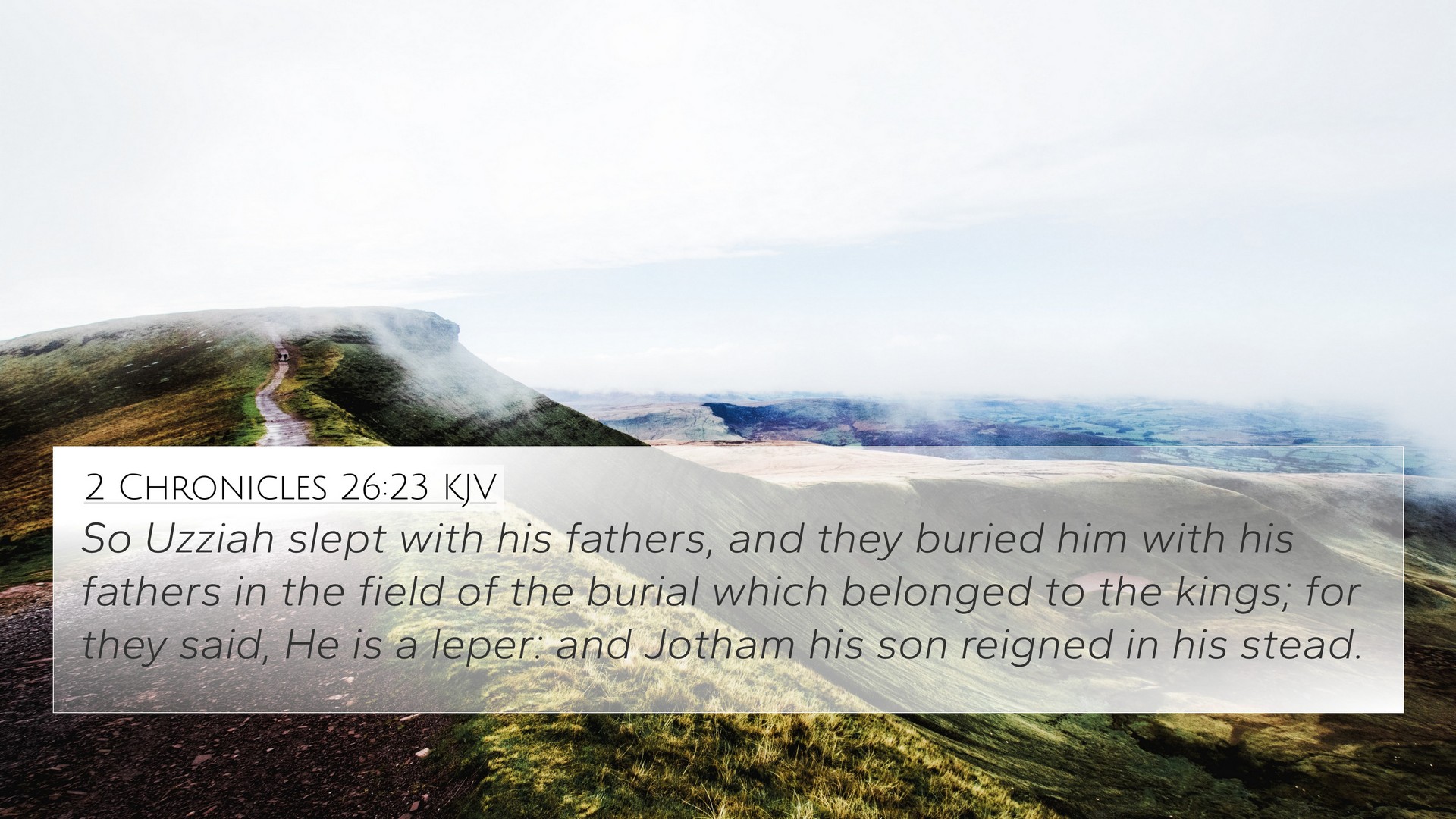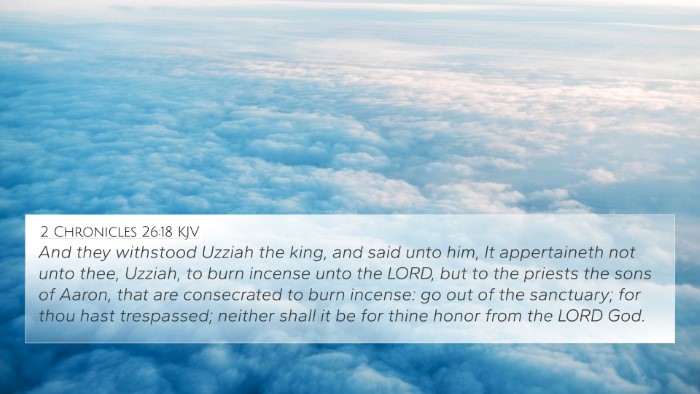Understanding 2 Chronicles 26:23
Verse: "So Uzziah slept with his fathers, and they buried him with his fathers in the field of the burial which belonged to the kings; for they said, He is a leper: and Jotham his son reigned in his stead."
Context and Significance
The passage concludes the account of King Uzziah's (also known as Azariah's) reign over Judah. Uzziah is remembered for both his achievements and his tragic downfall due to pride and disobedience to God. This verse highlights the importance of his burial and the legacy he left behind.
Commentary Insights
Commentaries provide deep insights into the spiritual and historical significances of this verse. Each commentary sheds light on Uzziah’s life, his accomplishments, and the reasons that eventually led to his downfall.
Matthew Henry's Commentary
Henry observes that Uzziah's reign was characterized by significant accomplishments, including military victories and fortifications of Jerusalem. However, his pride led him to attempt to burn incense in the temple, a duty reserved for the priests. This act of rebellion ultimately brought God's judgment upon him, resulting in leprosy, which marked his reign with tragedy. His burial outside the royal tomb indicates the grave nature of his sin and the seriousness with which God takes our disobedience.
Albert Barnes' Notes
Barnes emphasizes the king's initial righteousness and the blessings that followed his faithfulness. Uzziah sought God, and thus prospered, but his pride in his achievements led to his downfall. The mention of his leprosy and exclusion from royal burial rites underlines the consequences of turning away from God's commands. Uzziah's son, Jotham, who succeeded him, also faced the responsibility of living up to the legacy left behind, both the good and the bad.
Adam Clarke's Commentary
Clarke points out the physical and spiritual implications of Uzziah's leprosy. It serves as a strong warning against overstepping divine boundaries. The way Uzziah is remembered speaks to the importance of leaving behind a legacy that honors God. The burial in the field of kings denotes his former glory while reminding readers of the ultimate consequence of his actions.
Thematic Connections
This verse illustrates themes of leadership, pride, divine judgment, and legacy. Uzziah’s story has parallels across various parts of scripture, encouraging connections between different verses and narratives.
Bible Verse Cross-References
- 2 Chronicles 26:16 - Uzziah's pride leads to his downfall.
- 2 Chronicles 25:27 - Background on pride leading to disaster in leadership.
- Isaiah 6:1 - The year of Uzziah’s death; Isaiah's vision follows his reign.
- Proverbs 16:18 - “Pride goes before destruction, a haughty spirit before a fall.”
- Numbers 20:12 - God’s directives regarding the duties of priests.
- Micah 6:16 - Comparison of kings’ behavior and divine expectations.
- Matthew 23:12 - A New Testament reflection on humility before God.
- 1 Peter 5:5 - The call for believers to be humble; divine grace to the humble.
- Romans 15:4 - The value of scripture in providing hope and teaching through examples.
- Hebrews 12:1 - The call to run with perseverance, understanding the past.
Lessons from 2 Chronicles 26:23
The verse serves as a cautionary tale about the perils of pride and self-reliance. It draws attention to how one's legacy can be transformed by choices made throughout life.
Key Takeaways
- God holds leaders accountable for their actions.
- Pride can lead to one’s downfall despite previous successes.
- Legacy is shaped not just by achievements but by righteousness.
- Repentance and humility are vital for restoration.
- Our actions can have far-reaching effects on future generations.
Conclusion
2 Chronicles 26:23 encapsulates critical insights into the life of a ruler whose triumphs were marred by spiritual failure. By studying this verse, along with its related scripture, readers can gain understanding into the connections that exist within the biblical narrative. This aids in comprehensive biblical study and reveals the overarching themes of humility, accountability, and the importance of a faithful life.
As you engage with Scripture, consider using tools for Bible cross-referencing to enhance your study experience. Resources like a Bible concordance or a Bible cross-reference guide can assist in uncovering the relationships between various scriptures and deepening your understanding of biblical themes and narratives.








